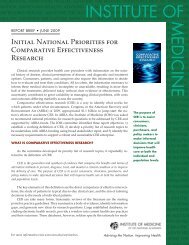You also want an ePaper? Increase the reach of your titles
YUMPU automatically turns print PDFs into web optimized ePapers that Google loves.
Longer term<br />
Recovery overseas will eventually lead to a revival <strong>of</strong> strong<br />
growth in China. Or will it? The problem is that, although<br />
China seems destined to avoid a “hard landing” for now,<br />
there are reasons to worry about this further down the<br />
road. The ability <strong>of</strong> China to maintain growth in the wake<br />
<strong>of</strong> the crisis in 2008–2009 was due to massive government<br />
support for investment. This investment now represents<br />
48 percent <strong>of</strong> GDP, widely viewed as unsustainable as<br />
has been discussed on these pages in the past. That is<br />
why there has been much discussion lately about reform<br />
in China.<br />
The government recently cooperated with the World Bank<br />
in producing a report titled China 2030, which <strong>of</strong>fers ideas<br />
on how China can sustain growth going forward. The<br />
report says that China’s current economic model is not<br />
sustainable and must be changed. It calls for more privatization<br />
<strong>of</strong> state-run enterprises, more reliance on market<br />
forces, the end <strong>of</strong> restrictions on internal migration, a<br />
boost to the social safety net in order to encourage more<br />
consumer spending, more transparent capital markets in<br />
order to funnel capital to the most pr<strong>of</strong>itable investments,<br />
and better fiscal controls for local governments that are<br />
currently laden with debt.<br />
It is not likely that these or other reforms will be enacted<br />
this year. That is because 2012 is a year <strong>of</strong> transition to<br />
new leaders. The outgoing Premier, Wen Jiabao, has<br />
spoken out about the urgent need for reforms. Incoming<br />
Premier Li Keqiang said that China must “deepen reforms<br />
on taxes, the financial sector, prices, income distribution,<br />
and seek breakthroughs in key areas to let market<br />
forces play a bigger role in resource allocation.” Yet, there<br />
China<br />
has been nothing more specific than this. Consequently,<br />
there is some uncertainty as to nature and timing <strong>of</strong><br />
future reforms. Failure to reform could allow imbalances<br />
to fester, leading to a crisis in the future. Reforms, on the<br />
other hand, could be disruptive and might challenge the<br />
interests <strong>of</strong> those that benefit from the current system.<br />
As such, China has no easy path. Meanwhile, the leadership<br />
debates the proper role <strong>of</strong> government, the growing<br />
problem <strong>of</strong> income inequality, and the degree to which<br />
changes in the political system are needed to ensure<br />
economic reform. Stay tuned.<br />
Kicking the can down the road<br />
In a year when political power will be transferred, the<br />
government is evidently keen to avoid major disruption<br />
to the economy. As such, it is likely that the government<br />
will utilize fiscal tools to boost economic activity if the<br />
economy faces even greater headwinds from abroad. In<br />
addition, the government has shown a desire to avoid, or<br />
at least postpone, the turmoil that might come from the<br />
unwinding <strong>of</strong> imbalances. Specifically, as discussed in this<br />
publication recently, local governments have accumulated<br />
about $1.7 trillion in debts that many analysts deem unsustainable.<br />
Moreover, a loss <strong>of</strong> revenue from weak land sales<br />
has exacerbated the problem <strong>of</strong> servicing this debt. Many<br />
analysts had recently been concerned about the possibility<br />
<strong>of</strong> an imminent crisis if banks were forced to write down<br />
these debts. Instead, the government has instructed banks<br />
to roll over the local government debt, thereby postponing<br />
the day <strong>of</strong> reckoning. Thus, there will probably not be a<br />
crisis any time soon.<br />
Geographies<br />
21











